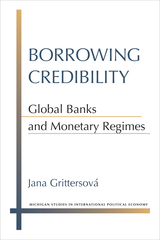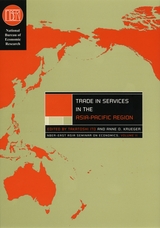
These banks enhance credibility by promoting financial transparency in the local system, improving the quality of banking regulation and supervision, and by serving as private lenders of last resort. Reputable multinational banks provide an enforcement mechanism for publicized economic policies, signaling to international financial markets that the host government is committed to low inflation and stable currency.
Grittersová examines actual changes in government behavior of nations trying to gain legitimacy in international financial markets, and the ways in which perceptions of these nations change in relation to multinational banks. In addition to quantitative analysis of over 80 emerging-market countries, she offers extensive case studies of credibility building in the transition countries of Eastern Europe, Argentina in 2001, and the global financial crisis of 2008. Grittersová illuminates the complex interactions between multinational banks and national policymaking that characterize the process of financial globalization to reveal the importance of market confidence in a world of mobile capital.


Popular anger against the financial system has never been higher, yet the practical workings of the system remain opaque to many people. The Heretic's Guide to Global Finance aims to bridge the gap between protest slogans and practical proposals for reform.
Brett Scott is a campaigner and former derivatives broker who has a unique understanding of life inside and outside the financial sector. He builds up a framework for approaching it based on the three principles of 'Exploring', 'Jamming' and 'Building', offering a practical guide for those who wish to deepen their understanding of, and access to, the inner workings of financial institutions.
Scott covers aspects frequently overlooked, such as the cultural dimensions of the financial system, and considers major issues such as agricultural speculation, carbon markets and tar-sands financing. Crucially, it also showcases the growing alternative finance movement, showing how everyday people can get involved in building a new, democratic, financial system.

The House of Morgan was the personification of economic power and the symbol of capitalism in the late nineteenth and early twentieth centuries. Other entrepreneurs were wealthier—industrialists like Rockefeller, Carnegie, and Duke—but none was relied upon more by business and government or better known in the world of high finance. Vincent Carosso, using for the first time the large collections that constitute the Morgans’ own business records, as well as other private papers and public archives, has constructed an in-depth account of the evolution, operations, and internal management of the Morgan banks at London, New York, Philadelphia, and Paris, from the time Junius Spencer Morgan left his Boston business to become a London banker to the death of his son and successor, John Pierpont Morgan.
The new data throw light on the Morgans’ business strategies, policies, and practices in financing such vast American enterprises as railroads, steel, farm equipment, communications, and the electrical industry. They also reveal the Morgan firms’ dealings in the political arena in their role as financiers of the United States government—Morgan banks funded the Civil War debt, met the Army payroll in 1877, stopped disastrous outflows of U.S. gold in 1894 and 1895, and acted as the country’s central bank in the panic of 1907—and as bankers for Mexico, Argentina, and many other governments.
This intricate and comprehensive history of the mechanisms of international finance, the waning of private banking houses and the evolution of commercial and investment banking, the risks and profits of high finance will interest historians of business, economics, the United States, and the modern world.

This volume is the first book-length attempt to analyze trade in services in the Asia-Pacific region. Contributors provide overviews of basic issues involved in studying the service sector; investigate the impact of increasing trade in services on the economies of Taiwan, Korea, and Hong Kong; present detailed analyses of specific service sectors (telecommunications, financial services, international tourism, and accounting); and extend our understanding of trade in services beyond the usual concept (measured in balance of payment statistics) to include indirect services and services undertaken abroad by subsidiaries and affiliates.
READERS
Browse our collection.
PUBLISHERS
See BiblioVault's publisher services.
STUDENT SERVICES
Files for college accessibility offices.
UChicago Accessibility Resources
home | accessibility | search | about | contact us
BiblioVault ® 2001 - 2024
The University of Chicago Press









